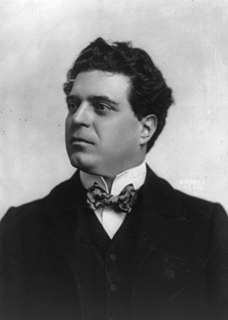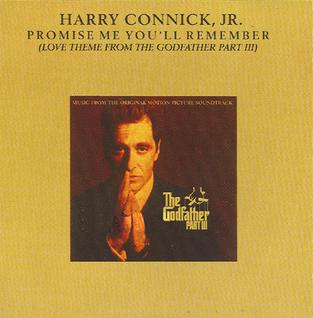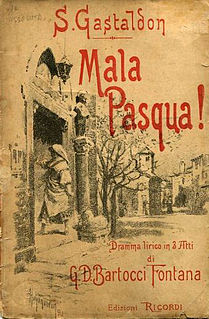
Pietro Mascagni was an Italian composer primarily known for his operas. His 1890 masterpiece Cavalleria rusticana caused one of the greatest sensations in opera history and single-handedly ushered in the Verismo movement in Italian dramatic music. While it was often held that Mascagni, like Ruggiero Leoncavallo, was a "one-opera man" who could never repeat his first success, L'amico Fritz and Iris have remained in the repertoire in Europe since their premieres.

The Godfather Part III is a 1990 American crime film produced and directed by Francis Ford Coppola from the screenplay co-written with Mario Puzo. The film stars Al Pacino, Diane Keaton, Talia Shire, and Andy García, Eli Wallach, Joe Mantegna, Bridget Fonda, George Hamilton, and Sofia Coppola. It is the third and final installment in The Godfather trilogy. A sequel to The Godfather (1972) and The Godfather Part II (1974), it concludes the story of Michael Corleone, the patriarch of the Corleone family, who attempts to legitimize his criminal empire. The film also includes fictionalized accounts of two real-life events: the 1978 death of Pope John Paul I and the Papal banking scandal of 1981–82, both linked to Michael Corleone's business affairs.

In opera, verismo was a post-Romantic operatic tradition associated with Italian composers such as Pietro Mascagni, Ruggero Leoncavallo, Umberto Giordano, Francesco Cilea and Giacomo Puccini. Verismo as an operatic genre had its origins in an Italian literary movement of the same name. This was in turn related to the international literary movement of naturalism as practised by Émile Zola and others. Like naturalism, the verismo literary movement sought to portray the world with greater realism. In so doing, Italian verismo authors such as Giovanni Verga wrote about subject matter, such as the lives of the poor, that had not generally been seen as a fit subject for literature.

Pagliacci is an Italian opera in a prologue and two acts, with music and libretto by Ruggero Leoncavallo. It is the composer's only opera that is still widely performed. Opera companies have frequently staged Pagliacci with Cavalleria rusticana by Pietro Mascagni, a double bill known colloquially as "Cav and Pag".
The siciliana[sitʃiˈljaːna] or siciliano[sitʃiˈljaːno] is a musical style or genre often included as a movement within larger pieces of music starting in the Baroque period. It is in a slow 6
8 or 12
8 time with lilting rhythms, making it somewhat resemble a slow jig or tarantella, and is usually in a minor key. It was used for arias in Baroque operas, and often appears as a movement in instrumental works. Loosely associated with Sicily, the siciliana evokes a pastoral mood, and is often characterized by dotted rhythms that can distinguish it within the broader musical genre of the pastorale.

Carmine Valentino Coppola was an American composer, flautist, pianist, and songwriter who contributed original music to The Godfather, The Godfather Part II, Apocalypse Now, The Outsiders, and The Godfather Part III, all directed by his son Francis Ford Coppola. In the course of his career, he won both Academy Award for Best Original Score and Golden Globe Award for Best Original Score with BAFTA Award and Grammy Award nominations.

The Godfather is a 1972 American crime film directed by Francis Ford Coppola, who co-wrote the screenplay with Mario Puzo, based on Puzo's best-selling 1969 novel of the same name. The film stars Marlon Brando, Al Pacino, James Caan, Richard Castellano, Robert Duvall, Sterling Hayden, John Marley, Richard Conte, and Diane Keaton. It is the first installment in The Godfather trilogy. The story, spanning from 1945 to 1955, chronicles the Corleone family under patriarch Vito Corleone (Brando), focusing on the transformation of his youngest son, Michael Corleone (Pacino), from reluctant family outsider to ruthless mafia boss.

"Promise Me You'll Remember " is a song written for The Godfather Part III (1990), the third film in The Godfather trilogy.

The 47th Academy Awards were presented Tuesday, April 8, 1975, at the Dorothy Chandler Pavilion in Los Angeles, California, honoring the best films of 1974. The ceremonies were presided over by Bob Hope, Shirley MacLaine, Sammy Davis Jr., and Frank Sinatra. This was the last year NBC aired the ceremonies before ABC secured broadcasting rights, which they still hold to this day.

The Godfather is the soundtrack from the film of the same name, released in 1972 by Paramount Records, and in 1991 on compact disc by MCA. Unless noted, the cues were composed by Nino Rota and conducted by Carlo Savina. The song "I Have but One Heart" is sung by Al Martino, who performed it in the film as character Johnny Fontane.

Osvaldo "Ozzie" Altobello is a fictional character and the primary antagonist of the 1990 film The Godfather Part III. In the film, he is portrayed by Eli Wallach.
Parisina is a tragedia lirica, or opera, in four acts by Pietro Mascagni. Gabriele D'Annunzio wrote the Italian libretto after Byron's poem Parisina of 1816.

"Speak Softly, Love" is a popular song published in 1972, with music by Nino Rota and lyrics by Larry Kusik. The song was first introduced as an instrumental theme in the 1972 film The Godfather that was simply known as "Love Theme from The Godfather". The highest-charting rendition of either version was by vocalist Andy Williams, who took "Speak Softly Love" to number 34 on Billboard magazine's Hot 100 and number seven on its Easy Listening chart.

Antonio Francesco Coppola was an American opera conductor and composer. He was the uncle of film director Francis Ford Coppola and actress Talia Shire, as well as the great-uncle of Nicolas Cage, Sofia Coppola, Gian-Carlo Coppola, Jason Schwartzman and Robert Schwartzman, and the younger brother of American composer and musician Carmine Coppola.
John Bettis is an American lyricist. He was originally part of the band Spectrum, which also featured Richard and Karen Carpenter. He wrote the lyrics for "Top of the World", a hit for both Lynn Anderson and The Carpenters. He wrote several more hits for The Carpenters, including "Only Yesterday", "Goodbye to Love" and "Yesterday Once More". He later wrote hits for other artists such as Madonna, Michael Jackson, The Pointer Sisters, Diana Ross, Jennifer Warnes, Peabo Bryson, George Strait ("Heartland"), Ronnie Milsap, and Barbara Mandrell.

American singer Harry Connick Jr. has released 26 albums, including 21 albums on Sony, three albums on the Marsalis Music label, and one each on Adco Productions and on Papa's-June Music.

It Had to Be You is a compilation album from Harry Connick Jr., released in Australia in 1991.

Cavalleria rusticana is an opera in one act by Pietro Mascagni to an Italian libretto by Giovanni Targioni-Tozzetti and Guido Menasci, adapted from an 1880 short story of the same name and subsequent play by Giovanni Verga. Considered one of the classic verismo operas, it premiered on 17 May 1890 at the Teatro Costanzi in Rome. Since 1893, it has often been performed in a so-called Cav/Pag double-bill with Pagliacci by Ruggero Leoncavallo.

Zanetto is an opera in one act by Pietro Mascagni to an Italian libretto by Giovanni Targioni-Tozzetti and Guido Menasci. It received its first performance on 2 March 1896 at the Liceo Musicale Rossini in Pesaro. Only 40 minutes long and with cast of two singers, Zanetto was originally described by its composer as a scena lirica rather than an opera. It is set in the countryside near Florence during the Renaissance and tells the story of an encounter between a beautiful courtesan, Silvia, and a young wandering minstrel, Zanetto. The libretto was adapted from an Italian translation by Emilio Praga of François Coppée's play Le passant in which the young Sarah Bernhardt had won fame in the en travesti role of Zanetto.

Mala Pasqua! is an opera in three acts composed by Stanislao Gastaldon to a libretto by Giovanni Domenico Bartocci-Fontana. The libretto is based on Giovanni Verga's play, Cavalleria rusticana which Verga had adapted from his short story of the same name. Mala Pasqua! premiered on 9 April 1890 at the Teatro Costanzi in Rome, six weeks before Pietro Mascagni's opera Cavalleria rusticana which was also based on Verga's play. Bartocci-Fontana's libretto adds some elements that were not in Verga's original and expands on others. The name of the Santuzza character was also changed to Carmela, but the basic plot and setting remain the same. Its title refers to the curse which Carmela places on Turiddu, the lover who had spurned her: "Mala Pasqua a te!". Following its Rome premiere, Mala Pasqua! had a few more performances in Perugia and Lisbon, but it was completely eclipsed by the phenomenal success of Mascagni's opera. After the 1891 Lisbon run it was not heard again until 2010 when it was given a semi-staged performance in Agrigento, Sicily.

















